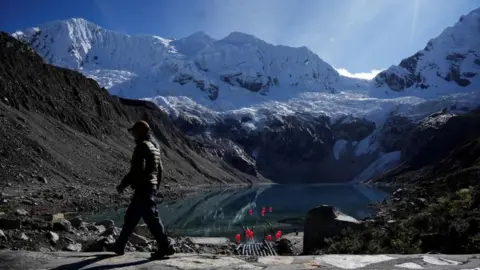German court rejects Peruvian farmer's landmark climate case
 Reuters
ReutersA court in Germany has rejected a lawsuit brought by a Peruvian farmer against German energy giant RWE in a long-awaited decision.
Saúl Luciano Lliuya had argued that the firm's global emissions contributed to the melting of glaciers in Peru - threatening his hometown of Huaraz with flooding.
He was seeking €17,000 (£14,250) in compensation - money he said he would use to pay for a flood defence project to protect the city.
However, the higher regional court in the German city of Hamm on Wednesday blocked the case from proceeding further and ruled out any appeals, putting an end to Mr Lliuya's 10-year legal battle.
RWE said it was not active in Peru and questioned why it was singled out.
It also pointed to its plans to phase out its coal-fired power plants and become carbon neutral by 2040.
In their ruling on Wednesday, judges deemed that the flood risk to the property of Mr Lliuya was not high enough for the case to proceed.
However, in what climate change groups have hailed as a win, they did say that energy companies could be held responsible for the costs caused by their carbon emissions.
While the sum demanded by Mr Lliuya was very low, the case has become a cause celebre for climate change activists, who hope that it will set a precedent for holding powerful firms to account.
The 44-year-old mountain guide and farmer said he had brought the case because he had seen first-hand how rising temperatures were causing glaciers near Huaraz to melt.
He said that as a result, Lake Palcacocha - which is located above the city - now has four times as much water than in 2003 and that residents like him were at risk of flooding, especially if blocks of ice were to break off from Palcacocha glacier and fall into the lake, causing it to overflow.
He alleged that emissions caused by RWE were contributing to the increase in temperature in Peru's mountain region and demanded that the German firm pay towards building a flood defence.
Mr Lliuya also said that he chose the company because a 2013 database tracking historic emissions from major fossil fuel producers listed the German energy giant as one of the biggest polluters in Europe.
 Reuters
ReutersMr Lliuya's original case was rejected by a lower court in Germany in 2015, with judges arguing that a single firm could not be held responsible for climate change.
But in a surprise twist, Mr Lliuya in 2017 won his appeal with judges at the higher regional court, which accepted there was merit to his case and allowed it to proceed.
His lawyers previously argued that RWE was responsible for 0.5% of global CO2 emissions and demanded that the energy firm pay damages amounting to a proportional share of the cost of building a $3.5m-flood defence for Huaraz.
 Reuters
ReutersGermanwatch, an environmental NGO which backed Mr Lliuya's case, celebrated the court's ruling saying it had "made legal history".
"Although the court dismissed the specific claim - finding flood risk to Luciano Lliuya's home was not sufficiently high - it confirmed for the first time that major emitters can be held liable under German civil law for risks resulting from climate change," it said in a statement.
The group said it was hopeful that the decision could positively influence similar cases in other countries.
